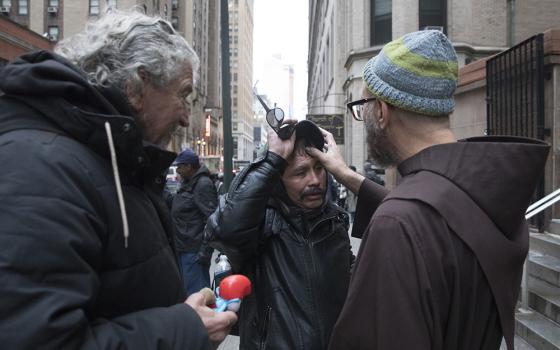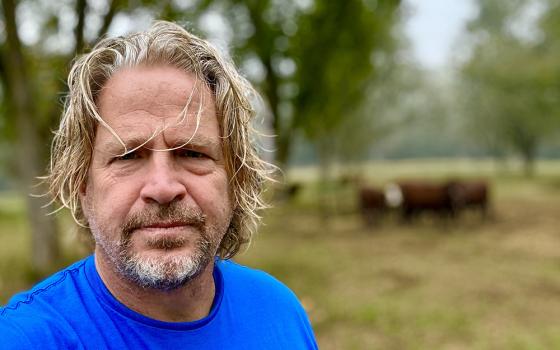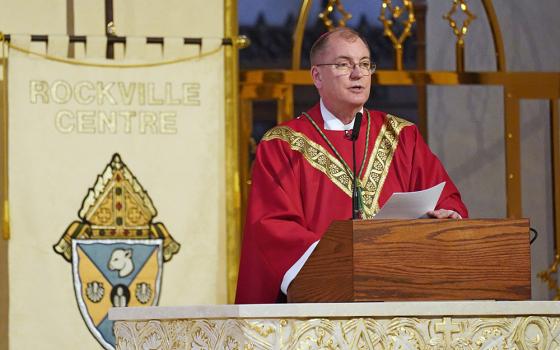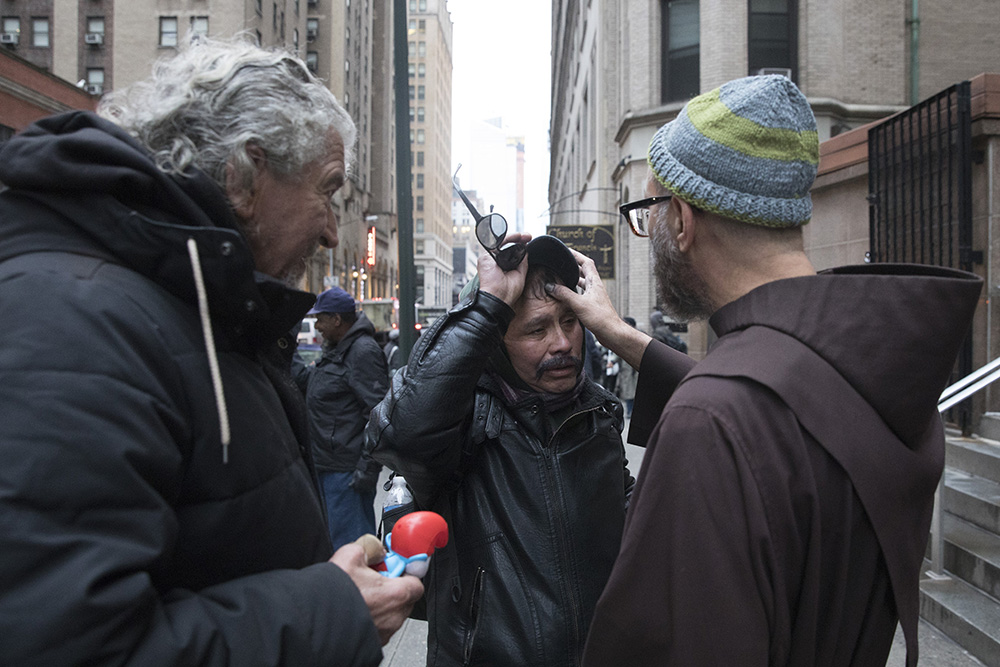
Franciscan Fr. Paul Lostritto marks a cross on the forehead of a homeless man on Ash Wednesday Feb. 14, 2018, at St. Francis Breadline in New York City. (CNS/Octavio Duran)
Editor's note: The Catholic Church has spent billions of dollars settling claims from sexual abuse cases. National Catholic Reporter is investigating the costs to Catholics, parishes and the church in its new series "The Reckoning." NCR's investigative reports, including this series, are made possible in part through the generosity of Annette Lomont.
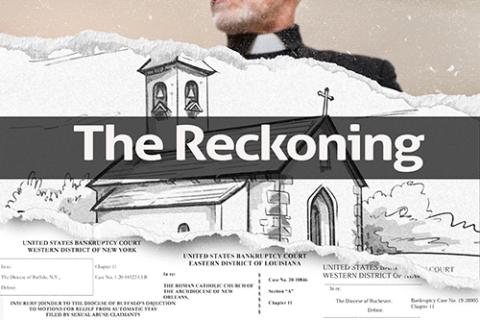
(NCR logo/Toni-Ann Ortiz)
Years ago, during the height of scandals involving television evangelists, CNN's Larry King interviewed famed evangelist Billy Graham.
When King brought up the scandals, questioning how Christianity reconciles itself to what is seen in the news, Graham responded with a metaphor, saying that scandals are like airplanes that crash. Every day, airplanes take off and land safely about 100,000 times worldwide, with little media attention. However, if an airplane crashes, the story will lead the evening news and be on the front page of newspapers everywhere. Yet a plane that crashes does not nullify the safety of the many other planes.
The "plane crash principle" can also help Catholics frame our understanding of clergy scandals in our own church.
Advertisement
Most people only know — or know about — priests from a distance. The reports of terrible incidents are then, understandably, the only lens for how they perceive Catholic priests. The priest who visits a grieving family at the hospital in the middle of the night does not make the news; but the priest involved in a scandal certainly does.
It should go without being said that incidents of clergy abuse are gravely serious and must be addressed correctly. Victims must be heard and taken seriously. Nevertheless, scandals do not reflect a complete picture of our church, its ministries or most of its ordained servants.
In 2002, during the height of the Boston Globe clergy sexual abuse stories, I was pastor of a parish where news broke that the previous pastor was being accused of molesting children. The devastating news rightly gained intense media attention very quickly.
I held a listening session in the church, making space for the anger of those who had been victimized as children, as well as the pain of their families; but truthfully, I felt completely unprepared for media relations and the work of keeping parishioners updated. I also had to cope with my own anger and feelings of inadequacy, as well as the shame of being professionally associated with the previous pastor. My seminary training was not enough for the heartbreak, rage and disgust that I addressed — both in my parishioners and in myself.
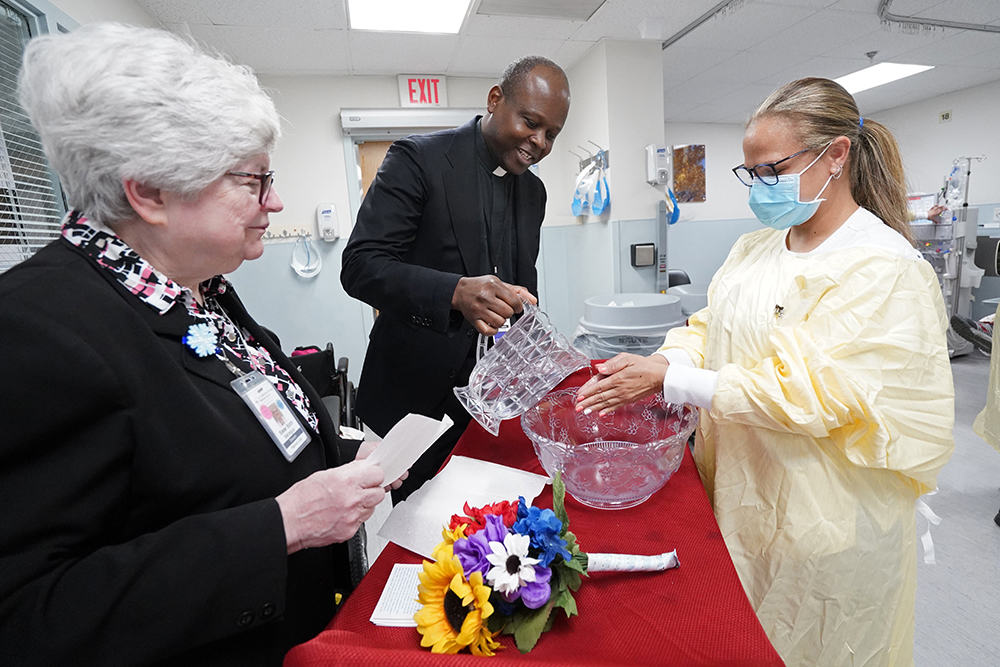
Fr. Francois X. Eale, chaplain at St. Catherine of Siena Hospital in Smithtown, N.Y., uses water as he blesses the hands of nurse Merissa Williams May 10, 2023. Looking on is Ursuline Sr. Edith Menegus, pastoral care director. (OSV News/Gregory A. Shemitz)
But despite such "plane crashes" in our church, the exceptional ministry of other priests and lay people never diminished in my eyes. I remained inspired, and still do to this day, because they live compelling lives — with or without (and it's almost always without) media attention.
One of my beloved brother priests once stepped between two angry street gangs and convinced them not to give in to violence. Another served two tours as a military chaplain, first with troops in Iraq and then in Afghanistan. When another was ordained, he served the homeless at a soup kitchen with his mother in lieu of having a reception. Forty-one years later, he remains as selfless as he was that day.
Beyond the priesthood, I have also witnessed the faithful goodness of lay Catholic parishioners; like the time when they organized meals for the homeless sheltering at a National Guard armory, or those who went to the home of a man who had taken his life and washed the carpet so his family would not have to see it, or when they made Thanksgiving dinner for 72 people fostering refugee children. I might wonder how people possess such compassion, only to realize their Christian faith inspires it. They inspire me, too.
I remained inspired, and still do to this day, because they live compelling lives — with or without (and it's almost always without) media attention.
While scandals can shake us, the vast majority of our priests and Catholic parishioners strive to live to the higher standard of compassion as set by our Lord Jesus. Still, this only rarely makes the news. Church scandals will continue, because we are not a church of angels but of real human beings. This never excuses the devastating scandalous behavior that breaks into the news cycle, nor does it alleviate the harm caused.
Why do I remain a Catholic? Some planes do crash. But every day, my brother priests and lay parishioners take off and land without problems and without being newsworthy. God's grace flows through them to me, and this grace is the reason for my hope. This is why I choose to remain a Catholic and a priest. They inspire me, and I want to remain on this plane.
I pray that, in some small way, I might inspire them, too.






